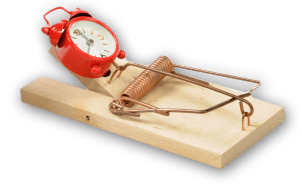
The benefits of technology set the expectation to get more done – faster – than ever before. But everyone needs space in the day. Creating or changing just a few routine habits helps to capture more time in the day for personal priorities.
1. Make the most of email
Email seems so basic and old-school, that many people forget to consider ways to make it more efficient. A few reminders:
- Turn off automatic send and receive in email software to get rid of the interruption. Designating specific times (like an appointment) to check email boosts productivity and creates a sense of control instead of distraction.
- Update rules for automatically sending mail to folders. Assigning each new contact or company to a folder saves time and helps prioritize the addressing of email messages. Create one or more folders for non-business purposes to read later, such as social media. Doing so cleans up the inbox and lowers that overwhelming feeling of too many messages. Look for the task bar item, “Rules, Create Rule” to get started.
- Initiate multiple email addresses for specific-use email (other than clients and employees). Examples include social media, mailing lists (retail), association meeting notices, and other subscription emails that don’t need immediate attention. Multiple email addresses are also helpful for special tasks such as hiring. Direct applicants to send resumes to the separate email account. When ready to review the resumes, they will be all in one place with no other email clutter.
- Use color categories to further sort and organize email within folders. This is the Categorize feature in Outlook located on the tool bar, or in the left sidebar of gmail. Categories may include functions such as accounting or sales, clients or type of clients, urgency, employees, or another grouping that helps keep or sort related/similar emails together.
2. Use mobile technology
Mobile time saving ideas could fill pages and pages. A starting point to move beyond email, maps, and Internet access on the phone is to consider tools for compliance.
MileIQ is a leading app for smartphones to help record mileage. It’s easy to use – swipe right for business, left for personal – to automatically log drives and calculate value. Use the app to create a mileage report with common stops such as home, daycare, office, and client locations.
The right phone for personal working styles also makes a difference. For reading large amounts of Internet text or graphs, the extra real estate from one of several Samsung Galaxy phones or an iPhone 6 (or 6s) Plus is unbeatable. And little things make a difference, such as using the iPhone 6s fingerprint reader instead of manually typing the lock code. Consider speaking instructions to call, text, or email with Siri instead of taking the time to type and fight with autocorrect. One more thing, newer glass technology, such as Tech Armor Ballistic Glass, prevents cracked glass and a broken phone. Who has time to spend replacing a broken phone?!
3. Set up automatic transactions
Most companies use Quickbooks for accounting. But most companies also fall short of using many helpful features. For example, memorized transactions are a life saver. Lucrum Consulting has a landscaping client who set up a custom service item for each customer. Each month they had to create the invoice using that item. While it wasn’t from scratch, since they had the description and price set, it was highly manual. Lucrum set up a memorized invoice for each customer using a generic service, but memorized the customer’s price and description in the invoice. Now, the company enters all invoices as a batch and emails them directly to the customer all at once, not individually. The result is 30+ invoices sent to 30+ customers in under five minutes with 100% accuracy.
Other transactions to consider setting up are recurring payables, such as insurance and lease payments. Save time by reducing the steps of bill payment, and never incur a late fee due to a missed payment.
What else do you do to capture time in your day? We’d love to hear from you.



